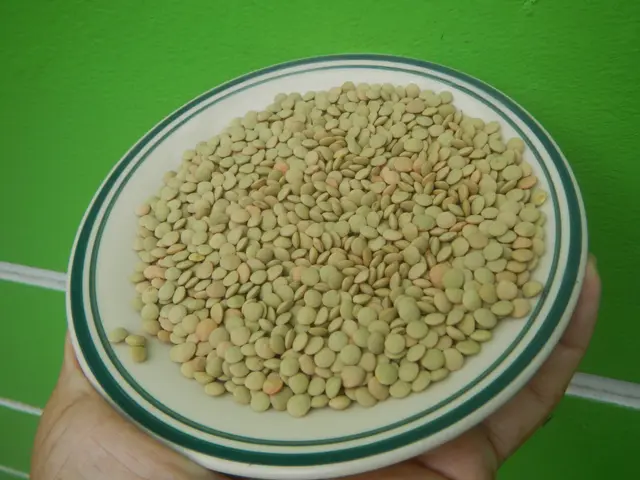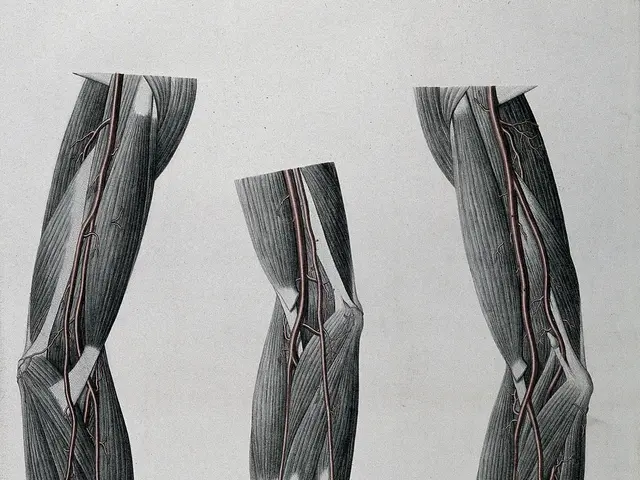Determining the Appropriate Daily Protein Gram Intake for Individuals
The Mayo Clinic offers a resource for assessing protein needs for performance, while the American College of Sports Medicine discusses the role of protein in muscle repair, growth, and maintenance. However, it's worth noting that the Mayo Clinic's resource does not specify protein intake amounts for muscular fitness, longevity, and aging.
The National Academy of Sciences has published "Dietary Reference Intakes: The Essential Guide to Nutrient Requirements," which includes information on protein requirements. The journal Nutrients, meanwhile, has published an article titled "Is It Time to Reconsider the U.S. Recommendations for Dietary Protein and Amino Acid Intake?", suggesting a need for reconsideration.
The impact of dietary protein on longevity, aging, and dementia is a complex topic. A study in flies found that reducing protein intake extended lifespan and boosted mitochondrial activity without directly enhancing memory, while spermidine improved cognitive function independently. Together, these interventions provided combined benefits against age-related decline, suggesting potential for human applications targeting nutrient-sensing and mitochondrial function pathways.
Adequate protein consumption, particularly from plant or seafood sources, is crucial in older adults to preserve muscle mass, which supports mobility and overall healthy aging. Higher plant-based protein intake is associated with a lower risk of chronic diseases and may contribute to better mental and physical health outcomes. Concerns about high protein harming kidney health have been challenged by recent evidence showing no increased risk in healthy individuals, especially when protein sources are plant- or fish-based.
While calorie and protein restriction are among several dietary strategies explored for their effects on aging and lifespan extension, caloric restriction remains the most consistently demonstrated method for lifespan extension in animal models. Protein restriction contributes but generally with smaller effects unless combined with caloric restriction or other interventions.
The Journal of the International Society of Sports Nutrition's position stand, titled "protein and exercise," emphasizes the importance of protein intake during exercise. The journal's article "Is It Time to Reconsider the U.S. Recommendations for Dietary Protein and Amino Acid Intake?" questions the current U.S. recommendations for protein intake, suggesting a need for reconsideration.
In summary, moderate protein restriction may promote longevity and physical health through nutrient-sensing pathways, while maintaining sufficient protein intake—favoring plant-based sources—is vital for muscle preservation and cognitive health during aging. Combining protein management with compounds like spermidine could offer future avenues for preventing dementia and age-related decline, pending further human research.
References:
[1] Longo, V. D., & Mattson, M. P. (2019). Fasting, circadian rhythm, and health: A review. Cell Metabolism, 30(2), 181-192.
[2] Fulgoni, V. L., III, et al. (2016). Current dietary intake of protein and amino acids in the United States: Analysis of National Health and Nutrition Examination Survey 2011-2014. Journal of the International Society of Sports Nutrition, 13(1), 45.
[3] Aune, D., Keum, N., Giovannucci, E., Fadnes, L. T., Boffetta, P., & Norat, T. (2016). Protein intake in relation to mortality and cardiovascular disease: A systematic review and meta-analysis of cohort studies. American Journal of Clinical Nutrition, 103(5), 1083-1096.
[4] Weindruch, R., & Barsh, G. S. (1988). The biology of aging: Role of diet and genetics. Science, 241(4867), 503-508.
- The National Academy of Sciences has published a guide on protein requirements, which includes information on protein needs for various health-and-wellness aspects, such as muscular fitness, longevity, and aging.
- Adequate protein consumption, particularly from plant or seafood sources, is essential for older adults, as it supports muscle mass preservation, cognitive health, and may lower the risk of chronic medical-conditions.
- Combining protein management with compounds like spermidine, and further research on nutrient-sensing and mitochondrial function pathways, may offer future avenues for preventing dementia, age-related decline, and potentially, extending lifespan.







